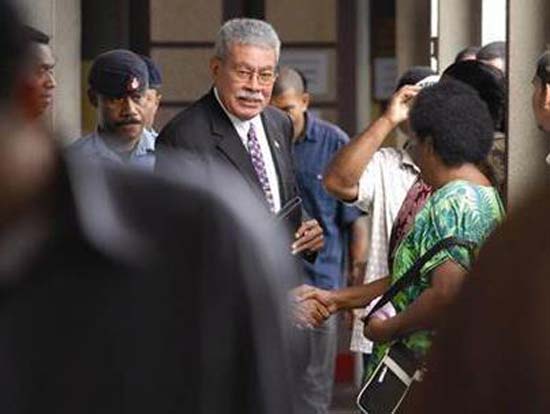
OPINION: The jailing of the former prime minister, Laisenia Qarase, for corruption is a personal tragedy for the man who once held the highest elected office in the land.
But it is also a powerful lesson for all Fijians that the days of looking after yourself and your kai vata (associates) at the expense of the wider community are over.
The pursuit of personal interest and the interests of relatives, extended family, village and province are so ingrained in the national psyche that Qarase seems to have convinced himself there was nothing wrong in what he did.
Fijian Holdings logoHow else to explain the total absence of “remorse or repentance” cited by Justice Priyantha Fernando when he said he had no alternative but to send Qarase to prison.
What he had done was both illegal and immoral – said the judge – but he wouldn’t acknowledge it. If this was the attitude of a man who moved in the top echelons of corporate Fiji as a merchant banker and company director, then you can be sure the same attitude exists on the part of others.
But in a publicly listed and highly profitable company like Fijian Holdings Limited, looking after yourself and those around you while keeping other stakeholders in the dark is corruption.
If you do it and the law catches up with you- as Justice Fernando made clear in his judgment – you will invariably wind up behind bars.
Fijian Holdings
Qarase used his position as director of a company specifically set up for the benefit of all I’Taukei to benefit his family and other Lauans. He obtained prized A Class shares for them in Fijian Holdings that paid healthy dividends into their bank accounts.
And he did it at the expense of other Fijians, who weren’t able to obtain those shares.
As a director of Fijian Holdings, he had a legal obligation to safeguard its interests and those of all its shareholders, not to pursue his interests and those of his kai vata.
He had a conflict of interest that he didn’t declare to his fellow directors in FHL, nor to two of the most important institutions in the vanua whose interests he was meant to represent as an adviser – the Fijian Affairs Board and the Great Council of Chiefs.
Simply put, it was a betrayal of the interests of all I’Taukei for the benefit of a few. These were Qarase and his family in the case of the family-owned Q-Ten Investments, the Qarase family and others in the case of Mavana Investments, and a company to which Qarase acted as financial advisor– the Cicia Plantation Co-op Society.
They were all allocated Class A shares in Fijian Holdings as a direct result of Qarase using his position to obtain them without telling the other stakeholders that he and they were beneficiaries. He was also present at the board meetings at which dividends were allocated without excluding himself.
‘Kangaroo court’
Of course, you won’t read about this on any of the websites which support Laisenia Qarase and his SDL party. For them, Qarase is a martyr, convicted by a “kangaroo court” on behalf of a regime waging a vendetta and trying to remove him from a glorious comeback in the election of 2014.
They keep citing the fact that the offences took place 20 years ago, long before Qarase became prime minister, as if this constitutes a legitimate reason not to have launched the prosecution.
Yet the means of pursuing such a case were noticeably absent until FICAC – the Fiji Independent Commission Against Corruption – was instituted after the Bainimarama coup of 2006. FICAC brought the prosecution – not the Director of Public Prosecutions – and it was clearly in the public interest.
The facts as outlined in Justice Fernando’s sentencing document speak for themselves.
“You [Qarase] facilitated the approval of the issuance and allotment of Class A shares to the three companies, Q-Ten, CPS and Mavana. It was done in priority to other eligible Provincial and Tikina Counciils, FAB (Fijian Affairs Board) and indigenous Fijian people. In doing so, you failed to disclose your interest and the relationship with the three companies to FHL, FAB or GCC. Your acts were prejudicial to the rights of Provincial and Tikina Councils, FAB and all other indigenous people”.
And so the sword of justice has fallen – guilty of six counts of abuse of office and three of discharge of duty with respect to a property in which he had a private interest.
The judge said he had no alternative but to send Qarase to jail based on several previous legal cases that had all involved custodial sentences. These included that of former Fiji Post chairman and current Fiji Times owner, Mahendra Patel.
Year behind bars
All told, Qarase will spend a year behind bars. His lawyer, Tupou Draunidalo, intends to lodge an appeal on Monday.
Only the most hardhearted Fijian wouldn’t have felt a degree of sympathy as the clearly broken 71-year-old embraced his wife, Leba, and his lawyers and was led away to prison.
The court was told he is suffering from worsening diabetes and a range of other serious illnesses, his wife has health issues including having suffered a stroke, he’s been deprived of his official entitlements and has five children and 15 grandchildren, some of whom are in his charge.
Jail is a terrible fall from grace for someone who led the country, one of its major political parties and was a pillar of his community and the Methodist Church.
But as the judge said, Qarase held high office in the public sector, was a financial advisor to government and the public vested their trust in him.
He had a duty to safeguard the interests of the Fijian people but he applied for shares for companies in which he had a private interest.
In doing so – Justice Fernando said – he had committed “a gross breach of trust” that warranted “an immediate custodial sentence”. As the former prime minister settles into his cell at Korovou Prison, it’s a time for national as well as personal reflection.
Because this is much more than the tragic downfall of one man. Here endeth an important lesson for every public official and every company director in Fiji.
This article was first published on the Graham Davis blog Grubsheet.
This work is licensed under a Creative Commons Attribution-NonCommercial 3.0 New Zealand Licence.




